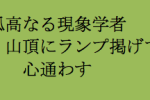Posts Tagged ‘
cultural psychology ’
Aug 12th, 2016 |
By Marc Applebaum

I am sharing the slides from my presentation at the 31st International Congress of Psychology, held this July in Yokohama, Japan–a Husserlian, phenomenological perspective on the intertwining of self and Other. I draw primarily on Edmund Husserl’s genetic phenomenological account of the arising of the I in relation to a You, and I also dialogue with two founding
[continue reading…]
Posted in Feature |
Comments Off on Embodied Self and Other
Tags: Ales Bello, conference, cultural psychology, embodiment, empathy, Husserl, religion, spirituality
Jun 22nd, 2013 |
By Marc Applebaum

It may be that to see yourself, it is not sufficient to look at yourself in a mirror, because you may not want to see yourself or, more likely, you aren’t able to see yourself as the subject of your seeing. It may be that you do not want to pay attention to those
[continue reading…]
Posted in Feature |
Comments Off on Ferrarello: The Last Concert of the Greek National Symphony Orchestra; or The Need to Become a Subject
Tags: Badiou, cultural psychology, empathy, Ferrarello, Husserl, Stein
Apr 12th, 2013 |
By Marc Applebaum

Merleau-Ponty (1993) wrote, “For the speaker no less than for the listener, language is definitely something other than a technique for ciphering or deciphering ready-made significations” (p. 80). He is ever insistent that being-in-the-world is an embodied event, an ongoing discovery, and he relentlessly examines the ways in which experiences are given to us, prior
[continue reading…]
Posted in Feature |
5 comments
Tags: Applebaum, cultural psychology, hermeneutics, intersubjectivity, Merleau-Ponty, technology, Yoshida
Mar 27th, 2013 |
By Marc Applebaum

I love Teo and Febbraro’s (2002) observation that “Psychology’s history can be studied as a history of fads” (p. 458). Teo (1996) has written that psychologists “have tended to value meta-theoretical constructions from outside their discipline more than those from inside their disciplines,” with the popularity of these constructions shifting as one or another current
[continue reading…]
Posted in Praxis |
2 comments
Tags: Applebaum, cultural psychology, Husserl, Mohanty
Mar 25th, 2013 |
By Marc Applebaum

I’m happy to expand the linguistic diversity of our blog with this post of mine in Portuguese, which I offer with deep gratitude to the colleagues who volunteered to translate it: Eu ensino uma introdução à investigação psicológica para estudantes de doutorado que dura um ano. Muitos dos meus alunos são psicoterapeutas ou estão em
[continue reading…]
Posted in Praxis |
Comments Off on PhenomBlog em Português: Ser um ‘eu’ significa ser ‘único’?
Tags: Applebaum, cultural psychology, Merleau-Ponty
Feb 21st, 2013 |
By Marc Applebaum

Here is a link to a beautiful essay of Akihiro Yoshida’s, On Tamamushi-iro Expression: A Phenomenological Explication of Tamamushi-iro-no (Intendedly Ambiguous) Expressive Acts. Dr. Yoshida is Professor Emeritus of the University of Tokyo, and Professor of Psychology, Shukutoku University. In Japanese, he writes, tamamushi-iro-no expressions are those that, when spoken, lend themselves to multiple differing interpretations by the one to whom they
[continue reading…]
Posted in Praxis |
2 comments
Tags: cultural psychology, intersubjectivity, Yoshida
Oct 29th, 2012 |
By Marc Applebaum

Merleau-Ponty (1968) wrote that questioning does not “fill in the blanks” in our knowledge. Instead, “the questions are within our life, within our history. They are born there, they die there, if they have found a response, more often than not they are transformed there” (p. 105). For phenomenologists, questions of any depth are never
[continue reading…]
Posted in Praxis |
Comments Off on The Internet: Closing or Opening Horizons?
Tags: Applebaum, cultural psychology, postmodernism, technology
Jul 10th, 2012 |
By Marc Applebaum

During the current global recession rising suicide rates have being witnessed across Europe; this is echoed by American data on increases in suicides and depression. I invited philosopher Susi Ferrarello to reflect upon the rash of suicides amid Italy’s social crisis. –Marc Applebaum Phenomenology and the Representation of Personal Identity I am writing and working in a language
[continue reading…]
Posted in Human Science |
4 comments
Tags: cultural psychology, Ferrarello, Husserl, intersubjectivity, Merleau-Ponty, postmodernism
Apr 23rd, 2012 |
By Marc Applebaum

As a phenomenological psychologist, I participate in the tradition of human science (Ger: Geisteswissenschaften). Since the foundation of this movement in the pioneering work of Giambattista Vico in the 18th century and Wilhelm Dilthey in the 19th, human science researchers have claimed that the study of human beings demands a radically different approach from that
[continue reading…]
Posted in Human Science |
Comments Off on Applebaum: Does Science Matter?
Tags: Applebaum, cultural psychology, human science, Husserl, psychotherapy








